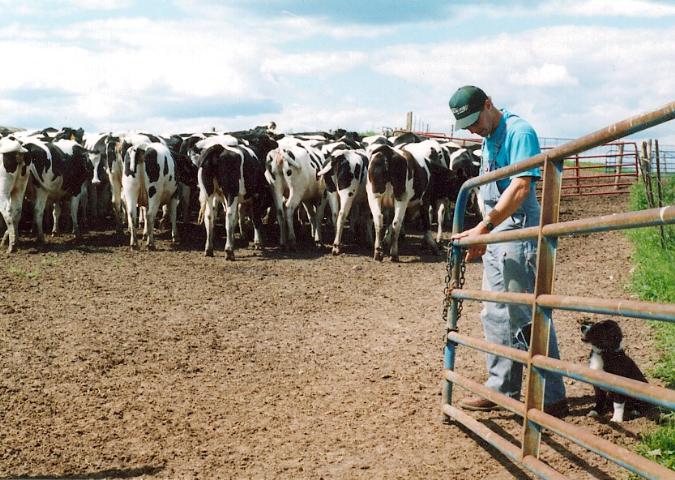Teaching the Pups

Chesney's Lilly Teaching the Pups
One of the great things about farmcollies is that they do not need extensive formal training, they do however need to bond to the livestock on the farm and learn the routines and rules. This is best done on a daily basis.
Here is a picture of Dan Hischke of Dad's Farms with Shooter as a pup.

Having a pup tagging along can really be a nuisance, but later when the dog is grown -the investment of a little extra time pays off in big dividends in a farm hand that can quickly navigate the muddiest pen or field to fetch the errant stock for whatever chore is at hand.

Good Shepherds Holly and Ellie being introduced to a new poult
As illustrated in the photo at the top of the page, one important advantage of raising your own replacement farm dogs is that the parents teach the youngsters what the rules are. It is imperative to understand that whatever the dog's perception of the rules, this perception is what the pups will learn, so do take time to make sure that they understand YOUR rules, and not just the parent's version!

Good Shepherds Judah teaching Holly about protecting the kids
This teaching behavior applies very well to how to react and interact with the livestock that are considered pack, however this will not necessarily apply to visitors to the farm- the older dog will not tell the younger ones not to bite the visitors, their presence may very well actually encourage the younger dog to be more bold and aggressive, adequate socialization MUST occur with each pup.
What if your pup does not turn out?
Sheryl Chesney says:
Some of the dogs just
seems to "turn on" so easily and quickly.
What I would take a look at would be how quickly the parents
started working (or catch on to the mentality of work). A pup being
taught by another dog how to read livestock and how to react to them
helps tremendously in the pups confidence and being able to get "it"
right.
Pups seems to go through fazes of trial and error before they can
consistantly do things in a way that suits us. The bond with their
human and an attitude of trying to please is a great plus. If they
do something wrong and do not get a correction quickly they will
assume that this is the thing to do.
I have no idea as to percentages of pups that do not turn out the
way we expect, but when they are young and around the livestock daily
you can see them "trying" in a puppy way to help. Some do take a lot
longer to grow up enough to work. I have found that if a pup is
given a specific job that it can do well it will boost his confidence.
I have had several pups that "try" but never get the hang of actually
helping (but I let them do no damage either). Jack (Kala/Banjo) is a
case in point. He just never seems to get it, would try and would
mess up royally. Great dog and never hurt anything but I would watch
him closely for mistakes.
He went to a pet home and is wonderful with the children and the
other dog and assists in taking care of their rabbits. He deters
hawks and protects the rabbits from other dogs. It is a job he can
do well. He lacked herding skill. He was one of 2 in this litter of
11 that went to a pet home.
I keep track of my pups as much as people will let me and I try not
to be aggravating about it to the new owners. Keeping track of them
gives me some insight into how well this mating worked. You can
never be 100% sure of how a pup will turn out as there are a lot of
variables.
Sometimes there is a "hump" in their training that has to be gotten
over before they can go on to learn other things. Almost like they
get stuck on one thing and keep going back to what they were doing
wrong until they figure out exactly what you want.
Consistancy is a big help in getting over the hump. It is so
surprising to watch them get it right one time and start making
progress from there on out. "The light has come on for them".
Amy was talking about positive attitudes toward a dog when you are
teaching and this is very true. If you are thinking the dog won't do
something, you have killed 50% of his ability right there. They read
this in you. If the training session can't be happy and positive,
wait until it can be.
Serena's Scarlett (Lilly/Banjo) is also one to look at. I would
have thought that she would have been doing it all at a very young
age from the way she was here as a pup. Serena had to work long and
hard to get her to have a reliable recall. this was Scarlett's "hump"
to get over. Now at nearly 2 she is coming into her own and comes
reliably (using a bell, LOL) and doing well with the livestock.
You are right too about sometimes things just don't work out with
the dog but most often they will surprise you as they mature. Don't
fault yourself and keep backtracking. Use each new day as an
opportunity to help him learn!
More training advice can be found at:
Teaching the Pup to Come
Your New Pup
More information on how the pups develop in the different aspects of their working character can be found at:
Hunting
Herding
Guardian
Biddability
American Working Farmcollie Association
AWFA Index
Contact AWFA
horses@itlnet.net


